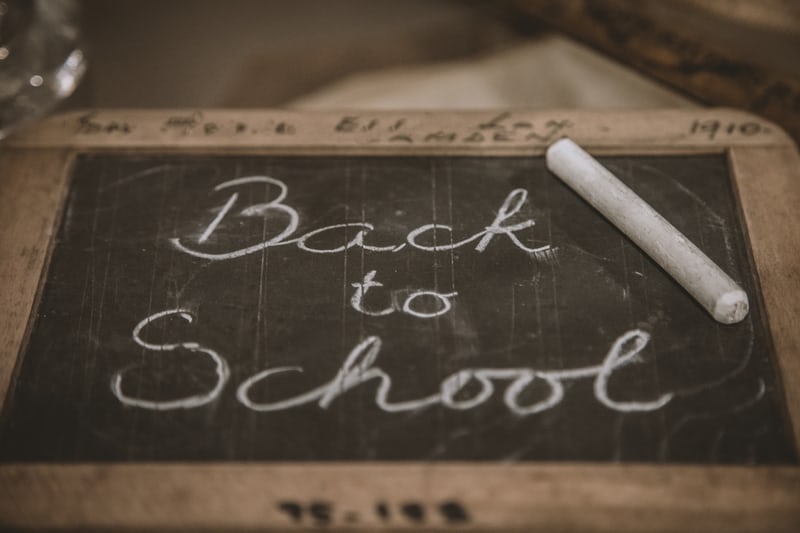Are you concerned about how this school year will be for your child? Here are ways to ease your worry.
Dana Reid, D.O.
Image by Deleece Cook from Unsplash
And just like that, it’s August and time for school to start back up. Usually, this season is buzzing with excitement and anticipation, as students gear up for another hectic school year. Stores are selling pencils, notebooks, and backpacks everywhere you look, with big, bright “BACK TO SCHOOL” signs all over the place. Malls are teaming with families picking out what clothes their child will need this year and what shoes they will grow into.
As a child psychiatrist, the weeks leading up to the first day of school are spent working closely with kids and parents to prepare for a successful year. We talk of returning to a regular sleep schedule after staying up late and sleeping in all summer, as well as addressing the various concerns that come with being back in a mentally, emotionally, and socially demanding environment. “Will I have a nice teacher? Will my friends be in my class? How will I keep up with all the homework?” I collaborate with my patients and their families to navigate these anxieties, and how to implement the strategies necessary to stay on the path to success.
Due to Covid-19, it comes as no surprise that this school year will look quite different than what any of us are accustomed to. We are now forced to address worries we may have never had to think about before. Suddenly, not only are we stressed about getting all the right textbooks and the special calculator for algebra, now we are actually having to assess health concerns.
This past month saw parents, teachers, school board members, as well as local government officials all weighed down with the responsibility for creating an idea of what the 2020–2021 school year would look like in their neighborhood. The resulting plans and academic options vary drastically from state to state, city to city.
One thing I’m sure we can all agree on is that these decisions are like nothing we have ever encountered before, and are overwhelming at times. Most of us have probably been wondering, “Am I making the right decision for my child? How will I ensure my child doesn’t fall behind? How will my child do without the extra support of a normal school environment? Will I be able to keep my job while also trying to watch my kids during the day? What if I can’t afford the tutors or to have my child in a learning pod?”
Below are 7 tips for easing anxiety during this time
- Flow with change and accept uncertainty. Since the onset of this pandemic, we have been forced to give up so much of our own control, but we have learned to adapt. I think we have even grown accustomed to existing with a heightened amount of uncertainty. Some of these adjustments have been very challenging, but we have been able to do it. If the last few months are any indication, we should know by now to expect the unexpected. We need to understand that any hard and fast expectations we have for this school year can change at a moment’s notice. If your school anticipates in person classes, there may be longer breaks or an abrupt switch to online learning depending on virus surges and local outbreaks. Anticipating change and being flexible with circumstances beyond our control will help us stay positive, motivated and lessen our disappointment.
- Stay optimistic about this year. Remind yourself of all the effort teachers and staff have put into designing a curriculum that will be as effective and engaging as possible under the present circumstances. With e-learning this fall, there will be more active and “live’ teaching. If you have the option of attending physical school, instead of focusing on what has been eliminated or redesigned as precautionary measures, think about how great it is for your child to be able to see their friends and teachers. Granted, it is not what we had hoped for, but there still remains a lot of good with either option.
- Maintain a consistent structure and routine. If you have children who will be going virtual this year, keep the most “normal” schedule you can. Have your child get up at their regular time and get dressed and ready for school. Prepare a hearty breakfast so your child can start the day with energy and focus. Set up a designated study area whether it be a desk in their room, or maybe the kitchen or home office. Keep it sunny and bright, and free from clutter and distractions. Add some colorful decorations or motivational signs to make it feel like a real classroom! It is not recommended that students study while sitting on or lying in their beds as it can lead to loss of motivation and feeling more sluggish.
- Know what to expect with school work. It is important very early in the semester, even before school begins if possible, to be familiar with where assignments are posted online and how you plan on ensuring your child completes them. Think about what helped your child stay on top of their online coursework in the spring, and what didn’t quite go so well. What organizational strategies can be implemented to help? Some ideas may be visual hanging calendars, whiteboards, or schoolwork apps like Google Classroom. Also, check to see what the school has available, if there is an app they recommend or other scheduling tools they are offering. Procrastinating or falling behind in the first few weeks can add significantly more stress and have you and your child feeling frustrated and defeated right away. If your child has an IEP or 504 Plan in place at school, establish strong communication with the advisors and teachers right away, and make sure you there is a clear understanding of how the accommodations and needs of your child will be met.
- Find outlets to help your child stay connected. If your child is going to school in person or staying home for e-learning, they will likely be missing some of their after-school activities. Find ways for your child to stay active. This could mean bike rides after school, outdoor sports like tennis that allow for distancing, or playing with neighbors outside. Some dance and karate studios are taking precautions such as masking to provide a safe outlet for kids. Look at signing up for virtual art or music classes. Talk to friends and neighbors to get ideas on what they are planning for their kids, and maybe you can work together on to come up with some activities.
- Give yourself grace and be kind to others. These are very trying times and be assured that if you had to make a tough decision about your child’s education, you made the right one for YOUR family. No decision is right or wrong, it is simply what is best for you and your family. Don’t let others judge you or make you feel bad for what you have chosen, and don’t judge others for theirs. We all have had different personal factors to consider in making a selection of in person or online school. You are not alone in these hard times. Reach out to friends and family for both emotional support and also for help in ways like picking up your kids if you need or helping them get set up with school work if you are working. Don’t be afraid to ask for help and let go of any guilt if you can’t be present or don’t feel like you can help your child with all their work. Remember it takes a village, and this may be the year we have to get extra creative to make school successful
- Take care of yourself. You can’t pour from an empty cup — You can’t be everything your family needs you to be if you are not taking care of yourself. Make sure you are getting adequate sleep, eating healthy meals, incorporating movement into your day and staying connected with friends. I also love mindfulness, yoga, and meditation to help with sleep, especially if it has become disrupted due to the excessive stress. Some good meditation apps are Calm, Headspace, 10% Happier and Insight Timer.



 RSS Feed
RSS Feed